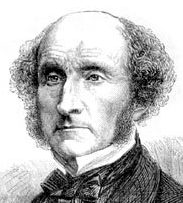The preservation of the American Constitution and American freedom is the paramount duty of any American President. American foreign policy is the mechanism through which these goals are prosecuted. American leadership is the means through which American goals are accomplished. The challenge for each president is to take the measure of his times, learn from the mistakes of the past, and foster and apply policies that are most likely to enhance the probability of achieving these objectives.
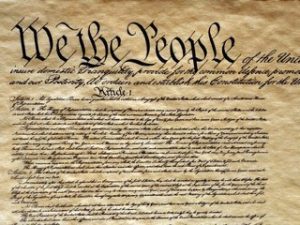
Too often over the course of American history presidents have misunderstood their times. They have either drawn the wrong lessons from the past or failed to understand the mistakes made by their predecessors. The recent past contains a pair of guiding lessons.
American Leadership: A Lesson from George W. Bush
In the aftermath of the attacks of September 11, 2001, President Bush determined to illustrate to the world that America would use its strength and power against any foe that it believed was a direct and immediate threat to American freedom and survival. But with this objective, his decision to invade Iraq became a stark example of a failure to apply lessons previously learned.
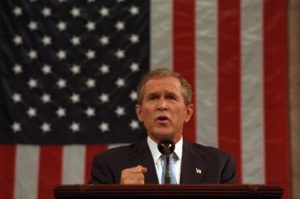
President Bush relied upon faulty intelligence to reach an incorrect conclusion as to the nature and degree of threat posed by Iraq to the United States. He proceeded under misconceptions because, at least to a degree, he failed to challenge the intelligence that he was provided and didn’t push hard enough to get it right. The necessity of challenging military advisers and the quality of intelligence is a lesson President Kennedy taught us long ago after the failed invasion of Cuba at the Bay of Pigs.
American Leadership: A Lesson from Barack Obama
President Obama, in turn, may have taken the wrong lesson from the Iraq experience. The Iraqi invasion was a direct use of military force that, arguably, failed to make the United States more secure. The invasion could fairly be seen as counterproductive to achieving American security goals. It was a direct use of strength that failed, and at great cost.
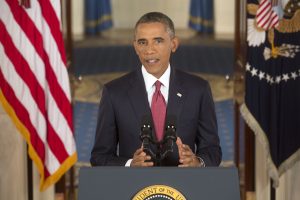
The world became a more dangerous and complicated place for the United States and its allies in the aftermath of the Iraqi invasion. President Obama’s foreign policy, at the least an indirect consequence of President Bush’s failure, may be characterized as an approach of disengagement. It may be viewed as a reluctance to directly project American power. It can be seen figuratively as a retreat by the United States back towards its own borders. A policy characterized by a willingness to act in foreign matters only in conjunction with others (either through the United Nations or otherwise). A policy marked by an unwillingness to project strength, directly or indirectly, whether with Syria, Russia, Iran or China. A strategy that uses mere words (drawing “lines in the sand”) or weak symbols (sailing a warship near contested islands in the South China Sea) in lieu of direct projections of strength.
The willingness to project strength, to project power, often has the beneficial effect of not having to actually use that strength and power. The United States and its allies become stronger as a result of America maintaining a firm commitment to strength.
American Leadership: Lessons From President Kennedy
President Kennedy’s words, a compilation of which follows, remain perhaps the best guide to continued peace and freedom for the United States:
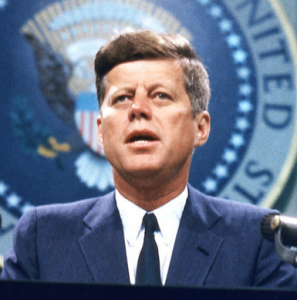
If we are strong, then peace will be our reward. If we desire to live at peace . . . the United States must be strong; not Strong “if”, not Strong “when”, not Strong “enough”, but Strong “first,” first in the fight for survival, first in building our defenses.
American Leadership Lesson #1: America must remain vigilant in its determination to build and maintain its defenses, including its nuclear arsenal, to demonstrate its continued commitment to strength.
I think the United States should be second to none [in national defense] . . . both because it provides for our own security and the security of those who look to us for protection, but also it represents the road to peace. If the United States is strong, then [Russia] or the Chinese Communists will not feel that the balance of power is moving in their direction but instead will make a determination that while other kinds of competition will go on, they will not be tempted to take a shortcut road to world domination.
American Leadership Lesson #2: American strength is the only road to peace.
There is no way to maintain the frontiers of freedom without costs and commitment and risk. There is no swift and easy path to peace. . .
We can convince friend and foe alike that we are in earnest about the defense of freedom only if we are in earnest.
American Leadership Lesson #3: A commitment to maintaining strength is the only means through which the United States can foster a greater likelihood of freedom and peace all around the world.
While we believe not only in the force of arms but in the force of right and reason, we have learned that reason does not always appeal to unreasonable mean — that it is not always true that “a soft answer turneth away wrath” — and that right does not always make might.”
American Leadership Lesson #4: We must adapt our approach depending upon who is on the other side. One size does not fit all.
We increase our arms at a heavy cost, primarily to make certain that we will not have to use them.
American Leadership Lesson #5: The stronger our military might, conflict becomes less likely.
Diplomacy and defense are not substitutes for one another. Either alone would fail. A willingness to resist force, unaccompanied by a willingness to talk, could provoke belligerence — while a willingness to talk, unaccompanied by a willingness to resist force, could invite disaster.
American Leadership Lesson #6: Neither military might alone, nor diplomacy alone, suffices.
We must always remind ourselves: “We have only ourselves to depend on for our security.”
